必修一英语话题4自然灾害
2022年人教版高考英语考点复习 必修1 Unit 4 Earthquakes

Unit 4EarthquakesU. N. Climate Change Report Sounds A “Code Red ForHumanity”联合国气候变化的报告为人类拉响了红色警报Global warming is dangerously close to spiralling out of control, a U. N. climate panel said in a landmark report Monday, warning the world is already certain to face further climate disruptions for decades, if not centuries, to come.Humans are “unequivocally” to blame, the report from the scientists of IPCC said. Rapid action to cut greenhouse gas emissions could limit some impacts, but others are now locked in.The deadly heat waves, gargantuan hurricanes and other weather extremes that are already happening will only become more severe.U. N. Secretary-General António Guterres described the report as a “code red for humanity”. “The alarm bells are deafening, ” he said in a statement. “This report must sound a death knell for coal and fossil fuels, before they destroy our planet. ” Activist Greta Thunberg called on the public and media to put “massive” pressure on governments to act.主题语境人与自然课标话题自然灾害与防范思维品质通过对文章的阅读和理解, 了解自然灾害对人类生活带来的影响以及人类活动导致的自然灾害, 并培养环保意识。
人教版高考英语一轮总复习 必修一 教材知识复习 Unit 4Earthquakes
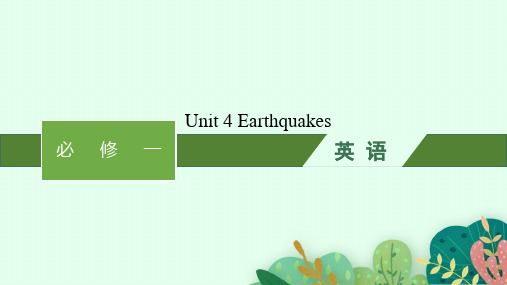
vt.损害;伤害
vt.& vi.(使)震惊;震动n.休克;打击;震惊
vt.使陷入困境n.陷阱;困境
8. ury
vt.埋葬;掩埋;隐藏
9. damage
n.& vt.损失;损害
10. frighten
vt.使惊吓;吓唬
11. congratulation
n.祝贺;(复数)贺词
12. judge
n.裁判员;法官vt.断定;判断;判决
the heroes went,they were warmly welcomed.
提能力 增分课堂
核心词汇突破
1.burst vi.(burst,burst)爆裂;爆发 n.突然破裂;爆发
【练会】完成句子
①他一出现就爆发了一阵掌声。
Upon his appearance there was
a burst of applause
踪、受伤或死亡
通词句 基础自测
[教材单词]
必背写作词汇
1. burst
vi.(burst,burst)爆裂;爆发 n.突然破裂;爆发
2. ruin
3. injure
n.废墟;毁灭vt.毁灭;使破产
4. destroy
5. shock
vt.破坏;毁坏;消灭
6. rescue
7. trap
n.& vt.援救;营救
【练会】单句填空
burst with anger勃然大怒
(2)a burst of一阵……
【佳句】Hearing this,the whole class burst into laughter and my
deskmate’s face turned red.
Unit4NaturalDisastersReadingandthinking教学设计-高中英语人教

人教版高一英语必修一Unit4 NA TURAL DISASTERS Reading and Thinking教学设计教材分析1.单元背景。
本单元以“自然灾害”为话题,包含了地震、火山喷发、海啸、飓风等自然灾害的介绍,以及如何在灾难中自救和救人的方法。
在自然灾害面前,人类有时显得很渺小,但是了解自然灾害,掌握自救和救人的方法,却能使我们有效地减少灾害带来的损失。
2.单元分析及教材处理。
为了让学生有充足的Natural Disasters 知识和正确的情感态度去面对自然灾害,而且学生也能学有所用。
本单元旨在让学生了解自然灾害的种类、发生的原因、危害以及如何自救和救人。
让学生对Natural Disasters 的知识有一定的了解,并明白各种自然灾害的破坏性。
使学生在认识的基础上进一步学习阅读课文里有关灾难——地震来临前的征兆和地震过程中的相关知识,并懂得在地震中如何自救,如何救人等内容。
在学习知识的同时增强了学生的社会责任感,树立了正确的人生观,价值观。
珍爱生命,在大灾难前要有大爱,这样也提高了学生的自身素养I.Teaching Content:Unit4 Earthquakes ReadingA Night the Earth Didn’t Sleep II.Teaching time:45 minutesIII.Teaching Goals1. Knowledge aim1). Get the students to learn some useful words and expressions.2). Develop the students reading ability and let them learn different reading skills.2. Ability aims:1). Get the students know damages earthquake bring about and the ways to reduce losses of earthquake.2). Get the students to know how to protect oneself and help others in earthquake.3. Moral aims:1). Know what damages an earthquake will bring about and the ways to reduce losses of an earthquake.2). Know how to protect oneself and to help others in an earthquake.IV. Important points:1.Words: shake, rise, crack, burst, well, smelly, pond, steam, destroy, ruin, injure, survivor, brick, useless, shock, quake, rescue, electricity, disaster, organize, bury, coal, mine, shelter, fresh, percent.2.Phrases: right away, at an end, lie in ruins, be trapped under sth, put up, give out, wake sb up, prepare sth for sth., think little of sth.3.Sentences:(1). It seemed as if the world was at an end.(2). Onethird of the nation felt it.(3). In fifteen terrible seconds, a large city lay in ruins.V. Difficult points1. The meanings of some words and expressions.2. Describe a natural disaster, such as an earthquake3. Understanding of sentences which contain Attributive Clause.VI. Teaching tools blackboard, courseware, tape recorder and some coloured ,pictures.VII. Teaching MethodsSituational teaching methods & interactive teaching methods, cooperative exploring methods.VIII. Teaching Procedures1.Greetings2. LeadinTeacher shows some pictures about the earthquake. Students look at the pictures and think of some new words relating to the natural disasters.3.Reading1). Fast readingTeacher shows the title and the photo on page fifty. Let students guess what the text is about. Student will be given five minutes to get the main idea and pay attention to the beginning and any sentences in each paragraph and find out the topic sentence and then match the main idea with each paragraph.Para.1: A.The rescue work.Para.2: B.The revival of the city.Para.3: C.Warning signs before the earthquake.Para.4: D.The happening of the big earthquake.Para.5: E.The immediate effects of the earthquake2). CarefulreadingStudents will be given five minutes to read part one carefully and do the following exercises: What were some of the strange things happening before the earthquake and how did people in react to the signs.How did people in Tangshan react to the signs?A.Ignorant. B.Alert. C.Sensitive. D. Casual3. What rhetorical device(修辞手法) does the author use in the sentence “the water in the village wells rose and fell, rose and fell”?A.Metaphor(比喻).B.Repetition(重复).C.Parallelism(排比).D.Personification(拟人).参考答案A AFunction: To make the description more vivid and involve the readers in the atmosphere.Students read part 2 carefully and do the following exercise and read paragraph 3 to carefully to do the following exercise the teacher will choose some students to show your answers for others1. How can we protect ourselves in an earthquake at school?2.What can you do after an earthquake?(Creative thinking)PostreadingGroupwork(1) Don’t be nervous and keep calm.(2) Don’t try to run out of the classroom.(3) Sit down under your desk.(4) Protect your head by putting your bag on your head.(5) Don’t use lift.(6)If possible,run to the schoolyard.IX. Group workStudents will be given five minutes to have a group of work to have a discussion about how can we protect ourselves in an earthquake at school and what can you do after an earthquake? Whatdo you think helped in the revival of city?What lesson can we learn from these events? Some students will be invited to share their answers for the other students.The spirit of bating disaster relief抗震救灾精神Whether in Tangshan earthquake or in Wenchuan earthquake, the most important thing is the spirit of Chinese people. Every time a disaster happens, we fight against it together and we never lose hope. That is the spirit of bating disaster reliefRecently, in the battle against COVID19, China did the best in controlling the virus. That is the result of the spirit of bating COVID19X. SummarySome students will be invited to have a summary about what did we learn today.XI. Homework1.Write a passage about your feelings after today’s passage learning.2.Finish activity 5.XII. Blackboard writingXIII. Teaching reflection课后反思依据教学目标,对学生的学习过程进行评价,旨在反思教学效果,不断改进自己的教学方法与策略。
人教版高中英语高三必修1Unit4 Earthquakes
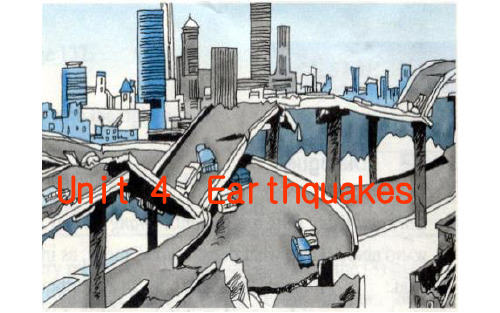
❖ 1/3 of the nation felt the earthquake .
❖ A huge crack that was 8 kilometres long and
30 metres wide cut across houses.
❖In 15 terrible seconds a large city lay in
If in a building: Open the
door when it begins to shake.
Never try to use the lift.
Don't rush out without order.
If on a road:
e something hard (硬的) to protect your head.
Para 1 Strange things were happening in the countryside of northeast Hebei.
Para 2 Everything began to shake. It seemed as if the world was at an end.
Topic sentence
Unit 4 Earthquakes
tornado
flood
volcano eruption
earthquake
Flood, Earthquake, Tornado ,Volcano,
Mud flow泥石 流
Hurricane 暴风雨
Hill slide滑坡
Natural disasters
Fire火灾
_ of its factories
Part3(Para 4): filling the blanks
高考英语一轮复习话题4自然灾害(Unit4Earthquakes)新人教版必修1

话题4 自然灾害〔Unit 4 Earthquakes〕晨读背诵根底知识自测一、单词拓展(A)根据音标及词义写出英文单词。
1. event [ɪˈvent]n. 事件;大事2. dirt [dɜːt]n. 污垢;泥土→dirty [dɜːt ɪ]adj. 脏3. burst [bɜːst]vi. 爆裂;爆发;n. 突然破裂;爆发4. ruin [ˈruːɪn]n. 废墟;消灭;vt.〔使〕破产;消灭5. injure [ˈɪndʒə(r)]vt.& vi. 损害;伤害→injured [ˈɪndʒəd]adj. 受伤→injury [ˈɪndʒərɪ]n. 伤口6. useless [ˈjuːslɪs] adj. 无用;无效;无益7. destroy [dɪˈstrɔɪ]vt.破坏;毁坏→destruction [dɪˈstrʌkʃn]n. 破坏8. electricity [ɪˏlekˈtrɪsətɪ]n. 电;电流;电学→electric [ɪˈlektrɪk]adj. 用电;带电→electrical [ɪˈlektrɪkl]adj.与电有关9. rescue [ˈreskjuː]vt.& n. 援救;营救10. disaster [dɪˈzɑːstə(r)]n.灾难;灾祸11. shock [ʃɑk]vt.& vi. 〔使〕震惊;振动n. 休克;打击;震惊12. bury [ˈberɪ]vt. 埋葬;掩埋;隐藏13. mine [maɪn]n. 矿;矿山;矿井→miner [ˈmaɪnə(r)] n. 矿工14. frighten [ˈfraɪt(ə)n] vt. 使惊吓;吓唬→frightened [ˈfraɪt(ə)nd] adj. 受惊;受恫吓→frightening [ˈfraɪtnɪŋ] adj. 令人恐惧15. judge [dʒʌdʒ] n. 裁判员;法官vt. 判定;判断;判决16. sincerely [sɪnˈsɪəlɪ]adv. 真诚地;真挚地→sincere [sɪnˈsɪə]adj. 真诚;真挚(B)单词活用用所给词正确形式填空。
人教版高中英语必修一 Unit4_书面表达(自然灾难篇) 题型专项突破 Word版含答案
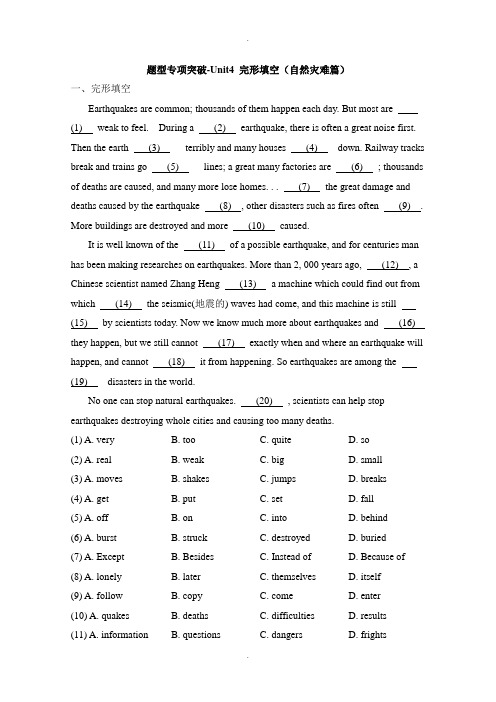
题型专项突破-Unit4 完形填空(自然灾难篇)一、完形填空Earthquakes are common; thousands of them happen each day. But most are(1) weak to feel. During a (2) earthquake, there is often a great noise first. Then the earth (3) terribly and many houses (4) down. Railway tracks break and trains go (5) lines; a great many factories are (6) ; thousands of deaths are caused, and many more lose homes. . . (7) the great damage and deaths caused by the earthquake (8) , other disasters such as fires often (9) . More buildings are destroyed and more (10) caused.It is well known of the (11) of a possible earthquake, and for centuries man has been making researches on earthquakes. More than 2, 000 years ago, (12) , a Chinese scientist named Zhang Heng (13) a machine which could find out from which (14) the seismic(地震的) waves had come, and this machine is still (15) by scientists today. Now we know much more about earthquakes and (16) they happen, but we still cannot (17) exactly when and where an earthquake will happen, and cannot (18) it from happening. So earthquakes are among the (19) disasters in the world.No one can stop natural earthquakes. (20) , scientists can help stop earthquakes destroying whole cities and causing too many deaths.(1) A. very B. too C. quite D. so(2) A. real B. weak C. big D. small(3) A. moves B. shakes C. jumps D. breaks(4) A. get B. put C. set D. fall(5) A. off B. on C. into D. behind(6) A. burst B. struck C. destroyed D. buried(7) A. Except B. Besides C. Instead of D. Because of(8) A. lonely B. later C. themselves D. itself(9) A. follow B. copy C. come D. enter(10) A. quakes B. deaths C. difficulties D. results(11) A. information B. questions C. dangers D. frights(12) A. as a result B. in fact C. for example D. as well(13) A. invented B. discovered C. found D. bought(14) A. country B. directions C. ways D. city(15) A. improved B. repaired C. protected D. used(16) A. where B. when C. what D. why(17) A. speak B. tell C. talk D. point(18) A. make B. prepare C. stop D. let(19) A. worst B. best C. most D. fast(20) A. However B. But C. And D. So二、完形填空(共20小题;每小题1分,满分20分0)阅读下面短文,掌握其大意,然后从(21)—(40)各题所给的四个选项A、B、C和D 中,选出最佳选项,并在答题纸上将该选项标号涂黑。
2020年高考外研版英语总复习必修1Module 4热点话题4——自然灾害

CHENBEI ·GAOKAO HUATI
1. United we stand; divided we fall.团结则存;分裂则亡。 2.To my delight, some people have been concerned about the environment. 让我高兴的是,一些人已经开始关心环境问题了。 3.What the director wants to tell us is that we should_________________ beautify the environment. 导演想要告诉我们的是我们tak应e 该me采as取ur措es施to美 化环境。
重点单词
高考
Hale Waihona Puke 话题CHENBEI ·GAOKAO HUATI
Firstly, don’t be nervous and keep calm. Try to get into an open area
away from trees, buildings, walls, signs, power lines and anything else
重点单词
高考
话题
CHENBEI ·GAOKAO HUATI
6. It is really amazing that the once-ruined place has now been turned
into a beautiful town, full of life .令人惊奇的是,这个曾经被毁灭的地
重点单词
高考
话题
CHENBEI ·GAOKAO HUATI
4.(2018·全国Ⅱ,阅读B篇)Many of us love July because it's the month when nature's berries and stone fruits are in abundance.我们中的许多人 喜欢七月,因为这是大自然的浆果和核果都丰盛的月份。 5.(2018·全国Ⅲ,语法填空)True to a gorilla's unaggressive nature, the huge animal meant me no real harm. 大猩猩的确没有攻击性,这个巨大 的动物对我并不意味着什么真正的伤害。
Unit+4+Natural+disasters+单元导读+课件-
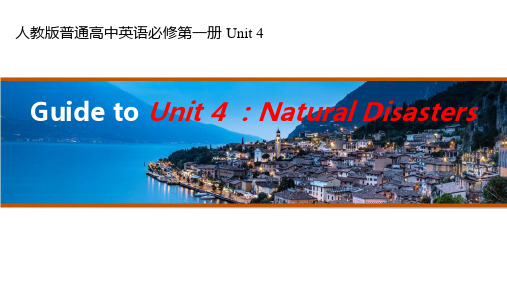
一、单元主题意义
单元主题意义: 本单元从认识各种自然灾害开始,接着介绍近代历史上国内外发生过的重大自然灾
害事件,再到探讨面对灾害的威胁和所造成的损失时,人们可以采取怎样的应对措施。 本单元力图体现“灾害无情人有情”的主题意义,即人类在重大自然灾害面前不屈不 挠,相互援助,坚定信心,重建家园。
、八方支援”的民族精
语篇5:Expanding Your World
类型:说明文
Байду номын сангаас
神与语篇5的中国国际
CHINA TO THE RESCUE!
主题:大爱无疆——介绍中国国际搜救队 搜救队展现的大爱无疆
,属于文化相关。
语篇6:WB Reading and Writing
类型:报告文学
语篇6与语篇4均是描述
语篇3:Video Time
类型:纪录片
语篇3与语篇2都是关于
TSUNAMI:KILLER WAVE
主题:介绍海啸原因、危害以及防范准备 海啸,属于内容相关。
语篇4:Reading and Thinking
类型:报告文学
语篇4凸显了“一方有难
THE NIGHT THE EARTH DIDN’T SLEEP 主题:描述自然灾害——唐山大地震
从思维角度来说,本单元要求学生写摘要,这对于进入高中不久的学生来说难度较 大。通过提炼关键信息、用自己的话语概括、归纳要点,对于提高学生分析、归纳、总 结等思维能力会起到很大的作用。
从文化角度来说,学生对于“众志成城”“灾害无情人有情”有一定的感悟。本单 元通过阅读中外两篇关于地震的纪实性报告文学,更加真实地领悟灾难面前的人道主义 精神,中国“一方有难八方支援”的民族精神。
人教版必修1 Unit 4 Natural Disasters (主题:自然灾害 )阅读与写作

人教版必修1 Unit 4 Natural Disasters (主题:自然灾害)阅读与写作【单元主题工自然灾害Today, scientists worldwide are studying plants and animals to build a better class of robots. Many of the robots may help with future rescue. And while some of these nature-inspired robots are in the lab, at least one type of these robots has been tested during a big natural disaster.Months ago, a big earthquake shook central Mexico. The quake resulted in hundreds of deaths and destroyed thousands of buildings. Before long, volunteers asked scientists from a lab at the Carnegie Mellon University to bring their snake robots to Mexico City to aid in the rescue efforts.Soon, scientist Matthew Travers, one director of this lab, and other scientists reached Mexico City and traveled between the city's fallen-down buildings. They used the cameras on the heads of the snake robots to look into a building/s open spaces and check if people were trapped inside.In the past years, scientists at the Carnegie Mellon University have worked to develop snake robots. By changing the designs of the robots made before, they created a “unified snake robot” , which could move through different types of terrain (地形).But Travers and his teammate Howie Closet said that the snake robots had somewhat limited success in the Mexico City earthquake. zz lt wasn't like what we had thought: we brought the snake robots down there and we won the war/'says Travers.The big reason was that the robots were not equipped with any microphones,speakers, or proximity sensors (接近感应器),Such kinds of modern equipment would have greatly improved the snake robots' ability to communicate with people who were trapped or to map the environment/The reason why wedon/t have more equipment is only because of money,''says Choset.Research on snake robots continues to move on. But Choset says it remains a challenge to get money to develop search-and-rescue robots.阅读下面短文,从每题所给的A、B、C、D四个选项中,选出最佳选项。
人教必修一Unit4_Listening_and_Speaking_名师教学设计
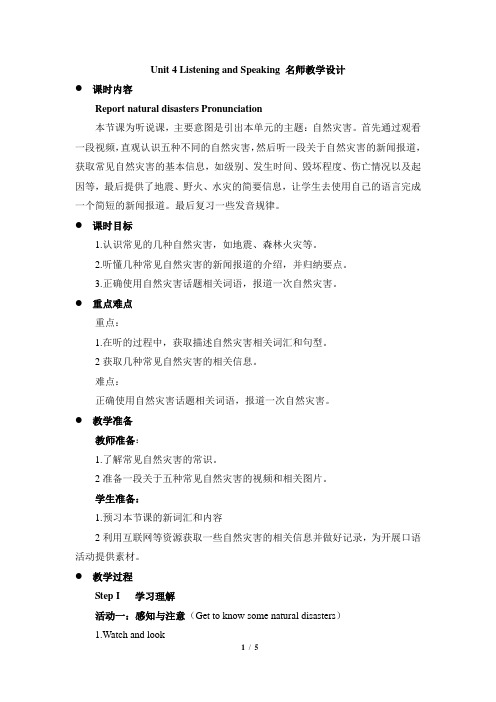
Unit 4 Listening and Speaking 名师教学设计●课时内容Report natural disasters Pronunciation本节课为听说课,主要意图是引出本单元的主题:自然灾害。
首先通过观看一段视频,直观认识五种不同的自然灾害,然后听一段关于自然灾害的新闻报道,获取常见自然灾害的基本信息,如级别、发生时间、毁坏程度、伤亡情况以及起因等,最后提供了地震、野火、水灾的简要信息,让学生去使用自己的语言完成一个简短的新闻报道。
最后复习一些发音规律。
●课时目标1.认识常见的几种自然灾害,如地震、森林火灾等。
2.听懂几种常见自然灾害的新闻报道的介绍,并归纳要点。
3.正确使用自然灾害话题相关词语,报道一次自然灾害。
●重点难点重点:1.在听的过程中,获取描述自然灾害相关词汇和句型。
2获取几种常见自然灾害的相关信息。
难点:正确使用自然灾害话题相关词语,报道一次自然灾害。
●教学准备教师准备:1.了解常见自然灾害的常识。
2准备一段关于五种常见自然灾害的视频和相关图片。
学生准备:1.预习本节课的新词汇和内容2利用互联网等资源获取一些自然灾害的相关信息并做好记录,为开展口语活动提供素材。
●教学过程Step I 学习理解活动一:感知与注意(Get to know some natural disasters)1.Watch and lookAsk students to watch the video Natural Disaster and look at the photos first.2.Write.After watching and looking,ask students to write down the names of the natural disasters.3.Check.Ask students to check the answers first in pairs or groups and then with whole class.Suggested answers①tornado②landslide③earthquake④wildfire⑤flood【设计意图】通过播放和观看一段关于五种常见自然灾害的视频,使学生有身临其境的感觉,调动身体多种感觉器官参与学习活动,能够大大提高学习效率。
人教版高一英语必修一Unit 4 Natural Disasters
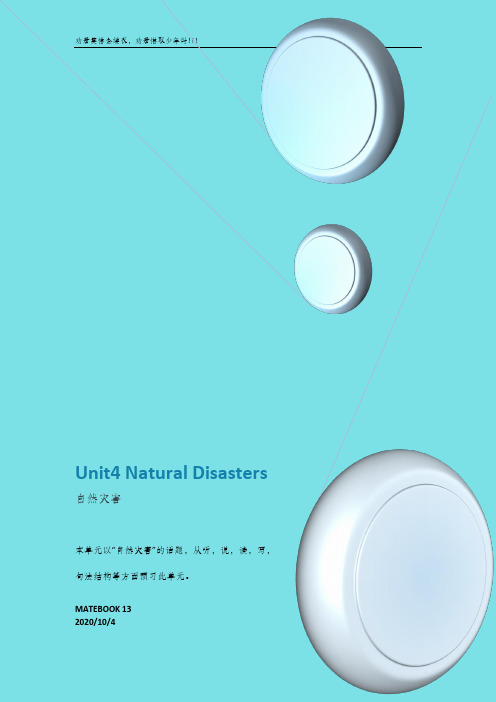
劝君莫惜金缕衣,劝君惜取少年时!!!Unit4 Natural Disasters 自然灾害本单元以“自然灾害”的话题,从听,说,读,写,句法结构等方面预习此单元。
MATEBOOK 132020/10/4Unit 4 Natural Disasters 第一部分:必备词汇和短语(key words and phrases):基础词汇:1.Tornado n. 龙卷风;旋风ndslide n. 崩塌;滑坡3.Tsunami n. 海啸4.Magnitude n.震级,重大5.Crack n.&v. 裂开,裂缝6.Percent n. 百分比7.Brick n. 砖8.Trap v. 使落入陷阱9.Drought n.干旱10.Slide vt. 滑坡11.Wave n.波浪,风浪12.Volcano n. 火山13.Typhoon n. 台风14.Hurricane n. 飓风15.Tap v.轻叩轻敲16.Pipe n. 管道17.Whistle v.吹口哨18.Kit n.成套设备19.Crash v.撞词汇派生拓展:1.Disaster n. 灾难-----disastrous adj.-灾难的-----disastrously adv.灾难地2.Flood n. 洪水-----flooding n.涝灾-----flooded adj. 发洪水的3.Rescue n.救援----rescuer n. 救援者4.Destroy v.破坏---destroyer n破坏者---destruction n.破坏----destructive adj 破坏性的5.evacuate vt.使疏散-----evacuation n 疏散,撤离6.death n.死-----die v. 死-------dead adj.------死的,没有生命的7.affect v. 影响-----affected adj. 有影响的------affection n.影响8.shelter n.庇护所-----sheltered adj. 有庇护的9.ruin v. 毁坏-----ruined adj.毁灭的10.metal n.-金属----metallic adj. 金属的11.shock n. V.震惊,惊讶—shocked 震惊的----shocking 令人震惊的12.electricity 电---electric 电的----electrical 电子的13.bury vt 埋葬-----burial n 埋葬14.breathe v呼吸.----breath n,呼吸-----breathless adj.上气不接下气的15.revive v 恢复------revival n.恢复16.effort n.努力-----effortless adj 毫不费力的17.wisdom n.智慧---wise adj. 明智的---wisely adv. 明智地18.Context n.上下文----contextual adj.练习上下文的19.Suffer v 遭受----sufferer n.遭受者------suffering n. 遭受20.Erupt v.爆发----eruption n. 爆发21.Supply v.供应---supplier n.—供应商22.Survive v.幸存—survivor n. 幸存者---survival n.幸存23.Power n.权利----powerful adj. 有权利的24.Emergency n.紧急---emergent adj. 紧急的-----emergence n.急诊25.Effect n.影响----effective adj. 有影响力的---ineffective 无影响力的26.Length n.长度----lengthen v,加长27.Deliver v.运输,输送----delivery n. 运输28.Strike v.罢工,袭击---striker n.----罢工者.短语积累:1.At least 至少2.Set up 建立e out of 出来4.As usual 像往常一样5.As if 似乎好像e to an end 结束7.Cut across 打断,径直穿过8.In ruins 严重受损9.Nothing but 只不过,除了10.Blow away 吹走11.In shock 震惊吃惊12.Fall down 倒下13.Dig out 挖掘14.Get up on one’s feet 重新站起来15.In times of 在的时刻,在时期16.Suffer from 遭受17.Go through 经历,讨论18.Volunteer to do sth. 自愿做什么事19.Wake up 叫醒20.Put up 张贴21.In the open air 在户外22.Stay calm 保持冷静23.Stay away from 远离24.Make sure 确信,确保25.First aid kit 一套急救设备26.In danger 处在危险处境27.On hand 在手边28.Crash into 冲撞29.Sweep away 消灭,彻底消除30.The number of 的数量31.Be expect to do 被期待做32.Write down 写下第二部分: 听力素养(listening skills)听说词汇:1. A strong earthquake 一场大地震2.Fall down 倒下3.Help the survivors 帮助幸存者4.Homes and land 家园和土地5.Be trapped in 陷入,被困于6.Rescue from 从… 中救援出来7.Volunteers and rescue workers 志愿者和救援人员8.Day and night 日夜9.Make sure 确信10.Caused by 由… 造成11.In the landslide 在滑坡中12.Lose one’s life 失去生命13.Get away from 避免听说句式;1. A strong earthquake hit Ecuador yesterday.昨天厄尔多瓜发生了一场大地震。
人教版高中英语必修一 Unit4_阅读理解(自然灾难篇) 题型专项突破 Word版含答案
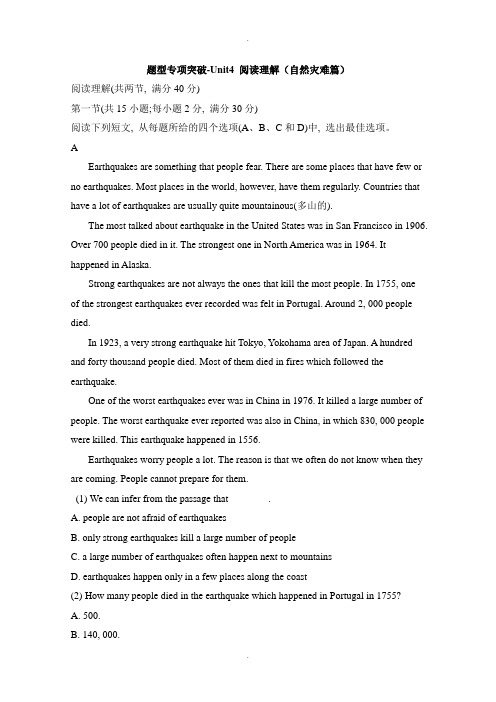
题型专项突破-Unit4 阅读理解(自然灾难篇)阅读理解(共两节, 满分40分)第一节(共15小题;每小题2分, 满分30分)阅读下列短文, 从每题所给的四个选项(A、B、C和D)中, 选出最佳选项。
AEarthquakes are something that people fear. There are some places that have few or no earthquakes. Most places in the world, however, have them regularly. Countries that have a lot of earthquakes are usually quite mountainous(多山的).The most talked about earthquake in the United States was in San Francisco in 1906. Over 700 people died in it. The strongest one in North America was in 1964. It happened in Alaska.Strong earthquakes are not always the ones that kill the most people. In 1755, oneof the strongest earthquakes ever recorded was felt in Portugal. Around 2, 000 people died.In 1923, a very strong earthquake hit Tokyo, Yokohama area of Japan. A hundred and forty thousand people died. Most of them died in fires which followed the earthquake.One of the worst earthquakes ever was in China in 1976. It killed a large number of people. The worst earthquake ever reported was also in China, in which 830, 000 people were killed. This earthquake happened in 1556.Earthquakes worry people a lot. The reason is that we often do not know when they are coming. People cannot prepare for them.(1) We can infer from the passage that________.A. people are not afraid of earthquakesB. only strong earthquakes kill a large number of peopleC. a large number of earthquakes often happen next to mountainsD. earthquakes happen only in a few places along the coast(2) How many people died in the earthquake which happened in Portugal in 1755?A. 500.B. 140, 000.C. 830, 000.D. About 2, 000.(3) When and where was the worst earthquake ever reported?A. 1964;Alaska.B. 1556;China.C. 1923;Japan.D. 1979;China.(4) According to the passage, which of the following is NOT true?A. The stronger the earthquake is, the more people are killed.B. Earthquakes often come unexpectedly.C. Earthquakes can cause fires.D. People still don’t know when an earthquake will come.答案:(1)-(4) C D B A解析:(1) 细节理解题。
新人教高中英语必修一Unit4 Nature Disasters单元分析讲义

Unit 4 Natural Disasters单元分析本单元主题:人与自然——自然灾害与防范一、单元内容分析本单元以自然灾害为话题,探讨在“人与自然”的主题之下,当人类面临自然灾害的威胁时,应该树立防灾意识,不断研究和认识自然灾害,提高在灾害中逃生的能力。
本单元学习设置从认识自然灾害的种类开始,到介绍近现代历史上国内外发生过的重大自然灾害事件,再到探讨面对灾害的威胁和所造成的损失时,人们可以采取的应对措施等。
本单元还力图体现“灾害无情人有情”的主题意义,即人类在重大自然灾害面前不屈不挠,相互援助,坚定信心,重建家园。
以下为教材各部分教学内容简要分析及教学活动实施建议:1.Opening Page主题图呈现的是解放军战士在汶川地震的废墟中运送伤者的感人画面,体现了在发生重大自然灾害时,军民同心,合力救助受灾人员的大无畏的人道主义精神,突出了解放军战士在赈灾工作中的重要作用和无私奉献精神。
了解自然灾害,积极应对自然灾害,知道防范和减少自然灾害损失的基本措施,是21世纪公民应该具备的基本素质。
开篇页的引言“Live to Tell:Raising Awareness,Reducing Mortality.”可以翻译为“用生命呼吁:增强减灾意识,减少人员伤亡”。
这句话是2016年联合国国际减灾战略(United Nations International Strategy for Disaster Reduction)的活动主题,目的是呼吁全球各地的人们重视自然灾害,树立防范意识。
2.Listening and Speaking:Report natural disasters 该部分听力文本为四则关于自然灾害的新闻播报。
第一则以早间新闻播报的形式,报道了厄瓜多尔一场突发的7.8级地震。
第二则是晚间新闻,是对发生在中国江西和湖南的洪水灾害的跟踪报道。
第三则是美国田纳西州孟菲斯南部当地电台对本地突发的龙卷风灾害的插入式新闻播报。
必修第一册 Unit 4 Natural Disasters

Ⅰ.认阅读单词1.tornado n.(pl.-oes or -os)龙卷风;旋风2.drought n.旱灾;久旱3.landslide n.(landfall)(山地或悬崖的)崩塌;滑坡4.tsunami n.海啸5.volcanic eruption火山喷发6.magnitude n.(地)震级;重大7.evacuate v t.疏散;撤出v i.撤离8.helicopter n.直升机9.crack n.裂纹;裂缝v i.& v t.(使)破裂10.brick n.砖;砖块11.metal n.金属12.revive v t.& v i.复活;(使)苏醒13.revival n.振兴;复苏14.unify v i.& v t.统一;(使)成一体15.volcano n.(pl.-oes or -os)火山16.erupt v i.& v t.(火山)爆发;(岩浆、烟等)喷出17.typhoon n.台风18.hurricane n.(尤指西大西洋的)飓风19.whistle v i.吹口哨;发出笛声v t.吹口哨n.哨子(声);呼啸声20.kit n.成套工具;成套设备21.first aid kit急救箱Ⅱ.记重点单词1.disaster n.灾难;灾害2.slide v i.& v t.(slid,slid)(使)滑行;滑动3.flood n.洪水;大量v i.淹没;大量涌入v t.使灌满水;淹没4.rescue n.& v t.营救;救援5.damage v t.损害;破坏n.损坏;损失6.destroy v t.摧毁;毁灭7.shelter n.避难处;居所;庇护v t.保护;掩蔽v i.躲避(风雨或危险)8.ruin n.& v t.破坏;毁坏9.percent n.百分之……adj.& ad v.每一百中10.trap v t.使落入险境;使陷入圈套n.险境;陷阱11.bury v t.埋葬;安葬12.effort n.努力;艰难的尝试;尽力13.context n.上下文;语境;背景14.supply n.供应(量);补给;[pl.]补给品v t.供应;供给15.tap v i.& v t.轻叩;轻敲;轻拍n.水龙头;轻叩;轻敲16.pipe n.管子;管道17.calm adj.镇静的;沉着的v t.使平静;使镇静18.aid n.援助;帮助;救援物资v i.& v t.(formal)帮助;援助19.crash v t.& v i.碰撞;撞击n.撞车;碰撞20.sweep v t.& v i.(swept,swept)打扫;清扫21.wave n.海浪;波浪v i.& v t.挥手;招手22.strike v i.& v t.(struck,struck/stricken)侵袭;突击;击打n.罢工;罢课;袭击Ⅲ.知拓展单词1.death n.死;死亡→dead adj.死的→deadly adj.致命的→die v.死亡2.affect v t.影响;(疾病)侵袭;深深打动→effect n.效果;结果;影响→effective adj.有效的3.shock n.震惊;令人震惊的事;休克v t.(使)震惊→shocking adj.令人震惊的→shocked adj.感到震惊的4.electricity n.电;电能→electric adj.电的;用电的→electronic adj.电子的5.breathe v i.& v t.呼吸→breath n.呼吸→breathless adj.气喘吁吁的6.wisdom n.智慧;才智→wise adj.明智的→unwise adj.不明智的7.suffer v t.遭受;蒙受v i.(因疾病、痛苦、悲伤等)受苦→suffering n.受难;苦楚→sufferer n.受苦者;受难者8.survive v i.生存;存活v t.幸存;艰难度过→survival n.幸存;生还→survivor n.幸存者;生还者9.power n.电力供应;能量;力量;控制力→powerful adj.强大的;强壮的→powerless adj.无力的10.emergency n.突发事件;紧急情况→emergent adj.紧急的→emerge v i.浮现;出现11.deliver v t.& v i.递送;传达v t.发表→delivery n.投递;送交12.summary n.总结;概括;概要→summariz(s)e v t.& v i.总结;概括13.length n.长;长度→long adj.长的→lengthen v.(使)变长1.ambulance n.救护车2.ancient adj.古代的3.anniversary n.周年纪念日4.annual adj.每年的5.antique n.古董,古玩6.apartment n.公寓7.apparent adj.表面上的;明显的Ⅳ.背核心短语1.as if似乎;好像;仿佛2.in ruins严重受损;破败不堪3.in shock震惊;吃惊4.in the open air露天;在户外5.on hand现有(尤指帮助)6.sweep away消灭;彻底消除7.refuse to do sth 拒绝做某事8.the number of...……的数量9.as usual像往常一样10.come to an end告终;结束Ⅴ.悟经典句式1.Chickens and even pigs were too nervous to eat,and dogs refused to go inside buildings.(too...to...)鸡甚至猪都太紧张而不能吃东西,狗也不愿意进屋里去。
Unit 4 Natural Disasters 必修第一册 高一英语单元话题写作整理与新高考之衔接
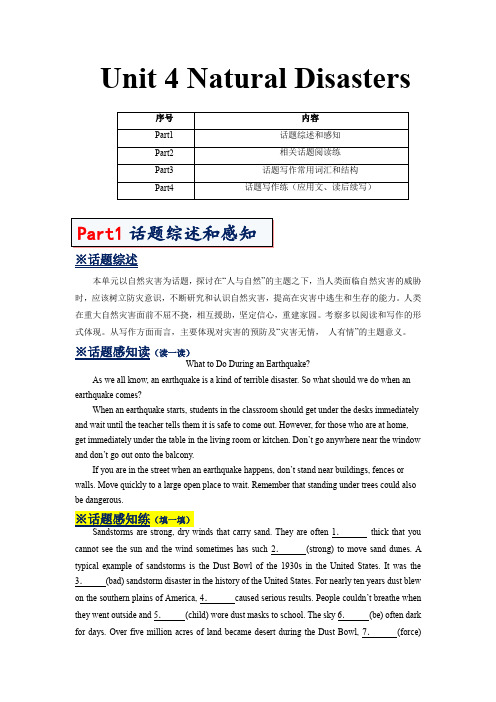
Unit 4 Natural Disasters※话题综述本单元以自然灾害为话题,探讨在“人与自然”的主题之下,当人类面临自然灾害的威胁 时,应该树立防灾意识,不断研究和认识自然灾害,提高在灾害中逃生和生存的能力。
人类在重大自然灾害面前不屈不挠,相互援助,坚定信心,重建家园。
考察多以阅读和写作的形式体现。
从写作方面而言,主要体现对灾害的预防及“灾害无情, 人有情”的主题意义。
※话题感知读What to Do During an Earthquake?As we all know, an earthquake is a kind of terrible disaster. So what should we do when an earthquake comes?When an earthquake starts, students in the classroom should get under the desks immediately and wait until the teacher tells them it is safe to come out. However, for those who are at home, get immediately under the table in the living room or kitchen. Don’t go anywhere near the window and don’t go out onto the balcony.If you are in the street when an earthquake happens, don’t stand near buildings, fences or walls. Move quickly to a large open place to wait. Remember that standing under trees could also be dangerous.1. thick that you cannot see the sun and the wind sometimes has such 2. (strong) to move sand dunes. A typical example of sandstorms is the Dust Bowl of the 1930s in the United States. It was the 3. (bad) sandstorm disaster in the history of the United States. For nearly ten years dust blew on the southern plains of America, 4. caused serious results. People couldn’t breathe when they went outside and 5. (child) wore dust masks to school. The sky 6. (be) often dark for days. Over five million acres of land became desert during the Dust Bowl, 7. (force)200,000 people to leave their homes.The disaster 8.(cause) by bad farming methods and several years 9.very little rainfall made things worse. The land dried up and the wind blew the soil away. 10.took over thirty years to reverse the process and replant the land.【答案】1.so2.strength3.worst4.which5.children6.was7.forcing8.was caused9.with。
- 1、下载文档前请自行甄别文档内容的完整性,平台不提供额外的编辑、内容补充、找答案等附加服务。
- 2、"仅部分预览"的文档,不可在线预览部分如存在完整性等问题,可反馈申请退款(可完整预览的文档不适用该条件!)。
- 3、如文档侵犯您的权益,请联系客服反馈,我们会尽快为您处理(人工客服工作时间:9:00-18:30)。
5. _d_i_g_o_u_t____ 掘出; 发现 6. _a_s_i_f______ 仿佛; 好像 7. _i_n_s_te_a_d__o_f_ 代替 8. _a_s__u_s_u_a_l __ 像往常一样
9. __b_e_t_r_a_p_p_e_d___ 被困住, 被套住 10. c_u_t__a_c_ro_s_s____ 横切 11. _tw__o_t_h_ir_d_s____ 三分之二 12. _d_is_a_s_te_r_-_h_it__a_re_a_s灾害侵袭的地区
形容词修饰后面的名词。
三、短语翻译
1. _r_ig__h_t_a_w__a_y__ 立刻; 马上 2. _a__(g_r_e_a_t_)_n__u_m__b_e_r_o_f许多; 大量的 3. _a_t_a__n_e_n__d___ 结束; 终结 4. _i_n__r_u_in__s____ 严重受损; 成为废墟
意为“矿工”。
令人恐惧的 4. His _fr_i_g_h_te_n_i_n_g_ (frighten) eyes made the boy feel_f_r_ig_h_t_e_n_e_d__ .
感到恐惧的
5. Bob left me his _e_le_c_t_r_ic__(electric) fan before he went to London.
二、单词拓展 (A)单词派生
1. _m__in_e____ n.矿,矿山 _m__in_e_r___ n. 矿工
2. _j_u_d_g_e_____ v. 判断 _j_u_d_g_m__en__t _ n. 判断;辨别力
3. _i_n_ju__re___ vt. 损害; 伤害 _i_n_ju__ry___ n. 损害; 伤害 _i_n_ju__re_d__ adj.受伤的
4. _c_o_n_g_r_a_t_u_la_t_e__ v. 祝贺; 恭喜 _c_o_n_g_r_a_t_u_la_t_io_n_ n. 祝贺; (复_c____ adj. 电的; 导电的 _e_le_c_t_r_i_c_it_y__ n. 电; 电流; 电学 _e_le_c_t_r_i_c_a_l__ adj.与电有关的
介词后要接名词。
2. My personal _ju__d_g_e_m__e_n_t_ is
that he is to blame. (judge) 形容词后接名词构成名词词组作
主语。
3. I think it is dangerous for _m__in_e_r_s (mine) to work in such terrible conditions.
四、语篇填空
At 3:42 a.m. everything began to shake. It seemed as if the world was at an end! Eleven kilometres 1 _d_i_re_c_t_ly_(direct) below the city, the 2 _g_r_e_a_t_es_t_(great) earthquake of the 20th century had begun. It was felt in Beijing, 3 _w__h_ic_h_is more than two hundred kilometres away. One-third of the nation felt it. A huge crack that was eight kilometres long and thirty metres wide cut across houses, roads and canals.
Steam burst from holes 4 _i_n_ the ground. Hard hills of rock became rivers of dirt. In fifteen terrible seconds a large city 5 _l_a_y_ (lie) in ruins. The suffering of the people 6 __w_a_s__(be) extreme. Two-thirds of them died 7 _o_r_were injured during the earthquake. Thousands of families were killed and many 8 _c_h_i_ld_r_e_n_ (child) were left without parents.
话题4 自然灾害
基础知识自测
1. _e_a_r_th__q_u_a_k_e__ n. 地震 2. _p_i_p_e___ n. 管;导管 3. _e_v_e_n_t__ n. 事件; 大事 4. _c_a_n_a_l__ n. 运河;水道 5. _b_r_i_c_k__ n. 砖;砖块
6. _s_h__e_lt_e_r___ n. 掩蔽处;避身处 7. __o_u_t_l_in__e__ n. 要点;大纲;轮廓 8. __d_i_s_a_s_te__r_ n. 灾难;灾祸 9. __b_u__r_y____ vt. 埋葬;掩埋;隐藏 10. _b__u_r_s_t___ vi. (burst, burst)爆发
11. _e_x__tr_e_m__e__ adj. 极度的 12. _s_i_n_c_e_r_e__ly_ adv. 真诚地; 真挚地 13. __r_u_i_n_____ n. 废墟 vt.毁灭 14. __e_x_p_r_e_s_s__ vt. 表示; 表达 n.快车 15. __j_u_d_g__e___ n. 裁判员; vt.断定
6. _f_r_i_g_h_t_e_n___ v. (使)惊吓 _f_r_ig_h__te_n__ed__ adj. 受惊的; 受恐吓的 _f_r_ig_h__te_n__in_g_ adj. 令人恐惧的
1. Two players are out of the team
because of _i_n_j_u_r_y_.(injure)
